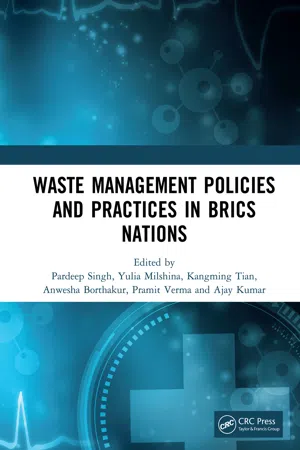![]()
Part I
MSW
![]()
1 Waste Management in Brazil
Challenges for Municipal Solid Waste
André C. S. Batalhão, Denilson Teixeira and Adriana Cristina Ferreira Caldana
Contents
1.1 Introduction and Objectives
1.2 General Background of Waste Management in Brazil
1.3 Challenges for Municipal Solid Waste in Brazilian Municipalities
1.4 The Importance of Indicators for Municipal Solid Waste Management
1.5 Using Solid Waste Indicators and Information for Brazilian Municipalities Management
1.6 Final Remarks and Further Reflections
References
1.1 Introduction and Objectives
Municipal solid waste management is a global challenge, especially in developing countries. In the BRICS countries (Brazil, Russia, India, China, and South Africa) this challenge is associated with increasing urbanization, constant population growth, increased per capita consumption and the exponential generation of municipal solid waste. In these countries, the proper management of municipal solid waste is a serious concern due to budgetary inability as a result of the high costs associated with its management, as well as the lack of technical knowledge about the main preventive and corrective factors, affecting the different stages of waste management.
The main aim of this chapter is to develop an analysis around solid waste management, conducting a critical assessment of a set of challenges identified in the literature. For this, an inductive-exploratory study was carried out, consisting of specific literature research and qualitative analysis of published documents. This analysis focused on concepts, approaches and case studies dealing with solid waste management. This was explored through a constructive perspective discussing what could be some of the new frontiers of the theme. This chapter is organized as follows: After a brief introduction to the research overview and context, the first section presents a general background, including the challenges for Brazilian municipalities. In the following section, there is a discussion on the importance of using indicators for solid waste management at the municipal level. In the last section, the final remarks are presented, as well as the contribution to the readers and the scientific community, including the practical and theoretical implications of the subject.
1.2 General Background of Waste Management in Brazil
Solid waste management is one of the most urgent and complex socio-economic and environmental challenges of our time, incessantly increased by population growth, lifestyle, consumption, technological change and government policy. This topic has emerged as one of the most challenging service sectors in the 21st century for municipal authorities (Coelho et al., 2016; Zaman, 2013).
In Brazil, the lack of effective enforcement of legal provisions and sufficient financial resources has perpetuated a considerable and growing shortfall in key points of the law: Maximizing the utilization and recovery of discarded materials and eradicating improper disposal practices, still present in all federation units and with negative health impacts on millions of Brazilians citizens (ABRELPE, 2017). In this context, some important issues raised: The legislation relevant to the theme and the current scenario in the country regarding urban solid waste.
Considered an important regulatory framework for solid waste in the country, Law number 12.305 of 2 August 2010 established the National Solid Waste Policy (NSWP). This normative structure is responsible for a number of advances in solid waste management in the country, for example, this policy: institutes guidelines, plans, and targets for all units of the federation; explores several terms such as final environmentally appropriate destination and integrated management; advocates for the adoption of decentralized systems, within an integrated plan, that identifies the problems, indicating solutions and technological alternatives, and establishes the deadlines; determines the shared responsibility of civil society, private enterprise and government for possible solutions to the solid waste problem; states that the waste management should be performed properly, and that the municipalities should include urban and rural areas in the planning of it; establishes general guidelines applicable to all types of solid waste except radioactive waste; defines for each Brazilian region a goal related to the reduction of recyclables and organic materials sent to landfill; determines the closure of improper disposal sites for solid waste within four years and sets a period for the completion of the Integrated Solid Waste Management Plans (Brazil, 2010).
A second necessary point for understanding the context of solid waste management in Brazil is to know the scenario of solid waste generation and disposal. The amount of solid waste collected in the country in 2017 was 71.6 million tons, recording a collection coverage rate of 91.2% for the country, which shows that 6.9 million tons of waste was not subject to consequently had an impr...
